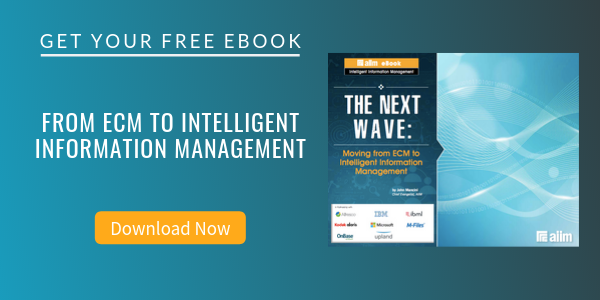
Thinking about Digital Business and Information Management
Intelligent Information Management (IIM)
A few months ago, we released Information Chaos vs. Information Opportunity: The Business Challenge of the Next Decade. Thousands of downloads later, the core thesis of the e-book -- we are at a fundamental inflection point being driven the accumulated impact of two decades of exponential improvements in technology – is being reaffirmed in a number of quarters.
Per Gartner: “By 2020, the number of things connected to the Internet will range from 30 billion to more than 1 trillion, overshadowing the expected number of personal devices at just more than 7 billion. Many of these things will be able to negotiate with one another over the Internet, and the impact on all industries will be disruptive. The future design of all industries will revolve around three principal connected entities: people, business and things. Digital business is not the decade-old concept of e-business in a new wrapper. It is a radically different and more disruptive change.”
Per Forrester: “Business leaders don't think of digital as central to their business because, in the past, it hasn't been. But now your customers, your products, your business operations, and your competitors are fundamentally digital. While 74% of business executives say their company has a digital strategy, only 15% believe that their company has the skills and capabilities to execute on that strategy. A piecemeal strategy of bolting on digital channels or methods is no longer sufficient.”
Per McKinsey: “The age of experimentation with digital is over. In an often bleak landscape of slow economic recovery, digital continues to show healthy growth. E-commerce is growing at double-digit rates in the United States and most European countries, and it is booming across Asia. To take advantage of this momentum, companies need to move beyond experiments with digital and transform themselves into digital businesses. Yet many companies are stumbling as they try to turn their digital agendas into new business and operating models. The reason, we believe, is that digital transformation is uniquely challenging, touching every unit while also demanding the rapid development of new skills and investments that are very different from business as usual.”
[Note: the Gartner and Forrester research on digital business is not generally available beyond their subscriber base. However, the McKinsey research is freely available and quite good. This article – Accelerating the Digitization of Business Processes – is a good place to start.]
So as we think about content and records and information, what does the digital business revolution mean?
I think Forrester’s differentiation between user-centric systems and operations-centric systems is quite useful. In many ways, it is the next iteration of some of the work we began with Geoffrey Moore that discussed Systems of Record and Systems of Engagement.
Here’s how I see the world of information management evolving. What do you think?

On the user-centric side of the continuum, insights derived from both public- and internal- analytics guide our interactions with customers, employees, and partners, and create new ways of engaging them.
This, in turn, drives content-intensive business processes and operations, which are continually realigned and restructured to meet the evolving needs of customers and employees.
Guiding all of this is a new focus on managing information as an asset that must be protected and preserved.
And all of the above occurring in a continuous and self-reinforcing cycle of change.
About John Mancini
John Mancini is the President of Content Results, LLC and the Past President of AIIM. He is a well-known author, speaker, and advisor on information management, digital transformation and intelligent automation. John is a frequent keynote speaker and author of more than 30 eBooks on a variety of topics. He can be found on Twitter, LinkedIn and Facebook as jmancini77. Recent keynote topics include: The Stairway to Digital Transformation Navigating Disruptive Waters — 4 Things You Need to Know to Build Your Digital Transformation Strategy Getting Ahead of the Digital Transformation Curve Viewing Information Management Through a New Lens Digital Disruption: 6 Strategies to Avoid Being “Blockbustered” Specialties: Keynote speaker and writer on AI, RPA, intelligent Information Management, Intelligent Automation and Digital Transformation. Consensus-building with Boards to create strategic focus, action, and accountability. Extensive public speaking and public relations work Conversant and experienced in major technology issues and trends. Expert on inbound and content marketing, particularly in an association environment and on the Hubspot platform. John is a Phi Beta Kappa graduate of the College of William and Mary, and holds an M.A. in Public Policy from the Woodrow Wilson School at Princeton University.



